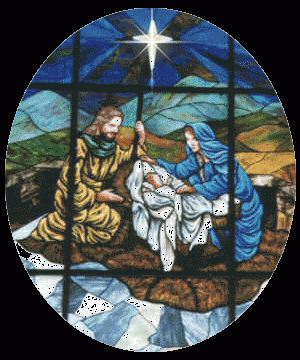photo-Nativity Catholic Church
Was Jesus born on Christmas? Not according to the Bible.
And now, compliments of the new book released by Pope Benedict this month, the traditional "nativity scene" itself has been debunked. According to the Pope, in his book "Jesus of Nazareth, the Infancy Narratives", the animals in the manger, and the angels singing in the sky - did not exist. The latest controversy introduced by the Pope is nothing new; scholars have been arguing the birth of Jesus and the Christmas story for centuries.
There is no mention of the date of Jesus' birthday in the Bible. If one were to interpret the story of the birth of Jesus Christ from biblical stories combined with historical data, the conclusion would be that he was born in September, or perhaps in April. In addition, the story of the Birth of Christ, and the placement of his Birthday on December 25th, suggests a very pagan influence. The first mention of the date of Jesus' birth on December 25th, revealed by a church calender, occurred in 336 CE (AD) -- centuries after He is said to have been born.
The pagan feast of the sun god, "Dies Natalis Solice Invicti", precedes the birth-date of Jesus on December 25th, and it was the time of pagan observance to celebrate the winter solstice. It is conceivable, and accepted by many historians, that the birth-date of Jesus was placed "over" this pagan holiday to coincide with widespread existing pagan celebrations of the time. The Pagan celebration of Winter Solstice is still observed by millions of people all over the world today.
One key point to acknowledge is the Gospel of Luke 2:8, mentioning "shepherds in fields" and "watching their flocks at night". Historians agree that shepherds did not keep sheep out in the fields in the winter night near the vicinity of Bethlehem in late December, because of the climate and cold weather. Many scholars contend that the shepherds would have had their sheep out to pasture at the end of the summer harvest. Thus, they conclude that Jesus was born in late September. But according to the Pope, the animals weren't present at Jesus' birth at all.
Many astronomers and astrologers have calculated a different time for the suggested date of Christ's birth. Using data based on the time of death of King Herod in 4 BCE(BC), combined with the complicated data using the alignment of the stars and planets, the suggested date of the birth of Jesus was sometime in April.
But the most controversial story may be presented by the Bible itself, as revealed by the Gospel of Mathew. His version of the birth of Christ is steeped in Paganism, beginning with the use of astrology by the "Magi". According to Mathew, the Magi found the birthplace of Jesus by utilizing astrology; "following a star". This act is argued by some scholars to be also interpreted as a form of divination, especially when performed by said magicians.
Magi is defined as: (Persian) wise men, magicians, magus, followers of Zoraster (diviners of the stars), practitioners of magic, and sorcerers, -- all of which are pagan in origin. If in fact, one were to accept the rendition of the birth of Jesus by Mathew, Jesus' life was saved by the Magi. According to the gospel, the Magi warned Mary and Joseph to to leave Bethlehem with Jesus because king Herod was going to kill all the infant boys in the town.
In effect, according to the Bible, Jesus survived, and was later able to perform his miracles because of the acts of the Pagan magicians who saved him from an untimely death. Arguably, Christianity may not exist today, if it were not for the timely conduct of those same Persian sorcerers.
Ironically, divination, magic, and sorcery are forbidden by the Bible. In addition, according to the Bible, Exodus 22:18 states (amongst other interpretations); "Thou shalt not allow a sorcerer to live".
If the demand by Exodus was followed, the Magi may have been put to death -- again begging the question of whether or not Christianity would have evolved.
In conclusion, as the controversy continues, have a Happy Winter Solstice, and a Merry Christmas.
(Note: You can view every article as one long page if you sign up as an Advocate Member, or higher).






